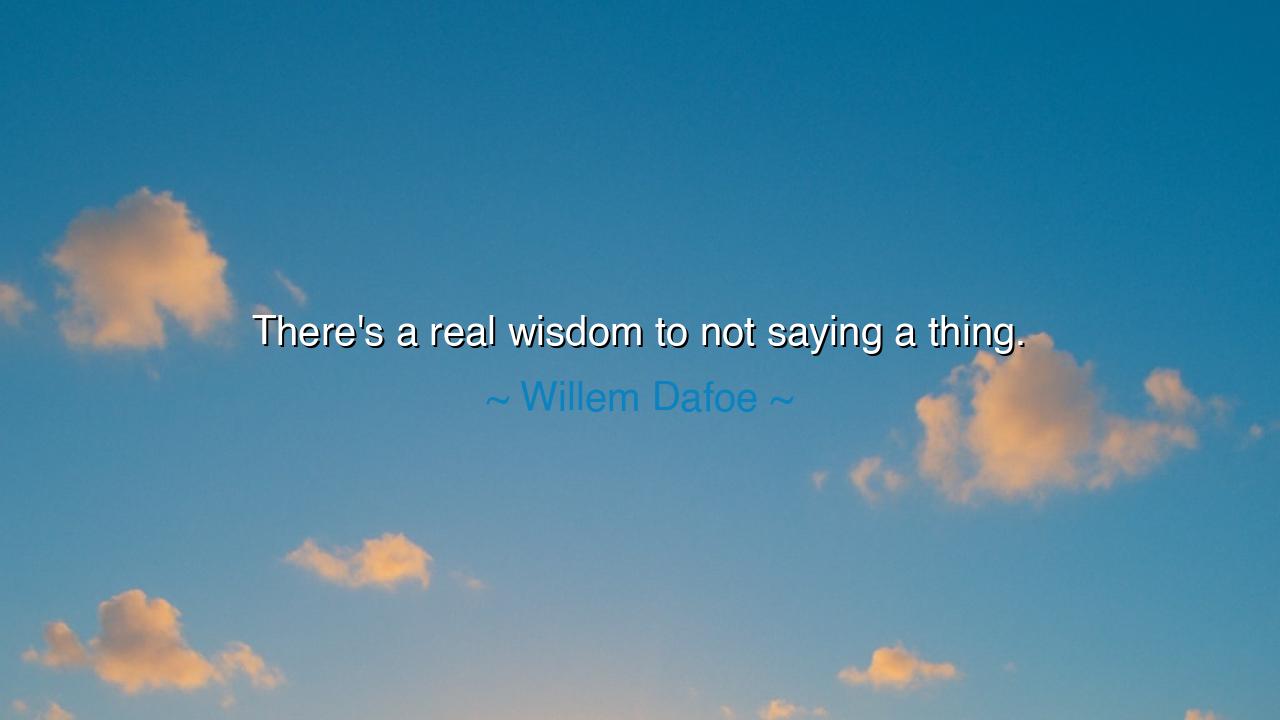
There's a real wisdom to not saying a thing.






Hear me, O children of the future, for I bring you the profound words of Willem Dafoe: "There's a real wisdom to not saying a thing." These words speak to the quiet power that lies in silence, in the decision to hold back when every instinct urges you to speak. In a world full of words, where the tongue is quick to shout and the mind eager to respond, there is a true wisdom in restraint. Silence is not the absence of speech, but the presence of a deeper, more discerning strength. To speak is easy; to remain silent requires understanding, patience, and a recognition that sometimes, the most powerful words are the ones unspoken.
Consider the wisdom of ancient philosophers such as Socrates, who often said, "Speak only if it improves upon the silence." Socrates, renowned for his dialogues, knew that there are moments when silence holds more power than the best-spoken words. Silence, for him, was a tool of reflection, a space in which the soul could digest and understand the world. In his conversations, he would often remain quiet, allowing his interlocutors to speak freely, for he understood that in moments of silence, the truth often revealed itself. Wisdom, then, is not just in the ability to speak, but in knowing when to listen, when to pause, and when to remain silent.
In more recent history, consider the great leaders such as Mahatma Gandhi, whose wisdom lay not only in his actions but in his silence. During moments of conflict, Gandhi often chose not to speak, allowing the silence to speak for him. In the midst of violence and unrest, his silence became a profound protest against the brutality of the world. It was in his silence that he showed the world the power of nonviolence, the strength that comes from inner peace and restraint. His refusal to respond to hatred with more words became his most potent weapon in the struggle for freedom.
Let us also look to Nelson Mandela, who, during his years in prison, chose silence over words. His quiet strength, his refusal to engage in the bitterness of his captors, became a symbol of resilience and wisdom. In moments of greatest adversity, Mandela’s silence spoke volumes. It was through his quiet actions that he demonstrated that sometimes, to act with the greatest wisdom, one must resist the temptation to speak. For in silence, there is a space to understand, to gather strength, and to forge a path forward with clarity.
So, O children, understand this: wisdom is not always found in words. In fact, it is often found in the restraint of speech, in the pause before action, in the power of silence. Learn to embrace silence, for it is in these moments that your spirit can grow, that you can truly listen, and that you can gain the clarity needed to make decisions that speak louder than words. Sometimes, the greatest wisdom is not in what we say, but in what we choose not to say.






CPDung Cu Phi
I love how Willem Dafoe's quote highlights a less obvious form of wisdom—one rooted in self-control and awareness. But I also wonder if there’s a danger in thinking silence is always wise. Could there be moments where not speaking up might contribute to allowing negative things to happen? Perhaps silence isn’t always golden if it means not challenging injustice or addressing important matters. How do we distinguish between silence that fosters peace and silence that enables complacency?
NTNha Tram
This really makes me think about the times when I've said too much and regretted it. Sometimes holding back from speaking can save us from making hasty decisions or saying things we don’t mean. But is there a risk that staying silent too much could cause us to miss opportunities for meaningful connection? Does it mean being too passive in situations that actually require us to express ourselves? It’s a tricky balance, isn't it?
TDThuy Duong
I find this quote intriguing because it emphasizes restraint in communication. In a world where everyone is encouraged to share their opinions, the idea of not saying anything can feel almost rebellious. Do you think people today over-talk and under-listen? Could it be that wisdom comes from learning how to listen more than speak, and knowing when our words would add nothing of value? How often do we find ourselves talking just to fill space?
MHNguyen Manh Hung
This quote really speaks to the power of silence, something we often overlook. Sometimes saying nothing can be more impactful than speaking, especially in moments of tension or conflict. But how do we know when silence is the wisest choice? Is it ever possible to overdo it? I feel like there’s a delicate balance between speaking up when necessary and knowing when to remain silent. Do we risk seeming distant or uncaring if we stay quiet too often?